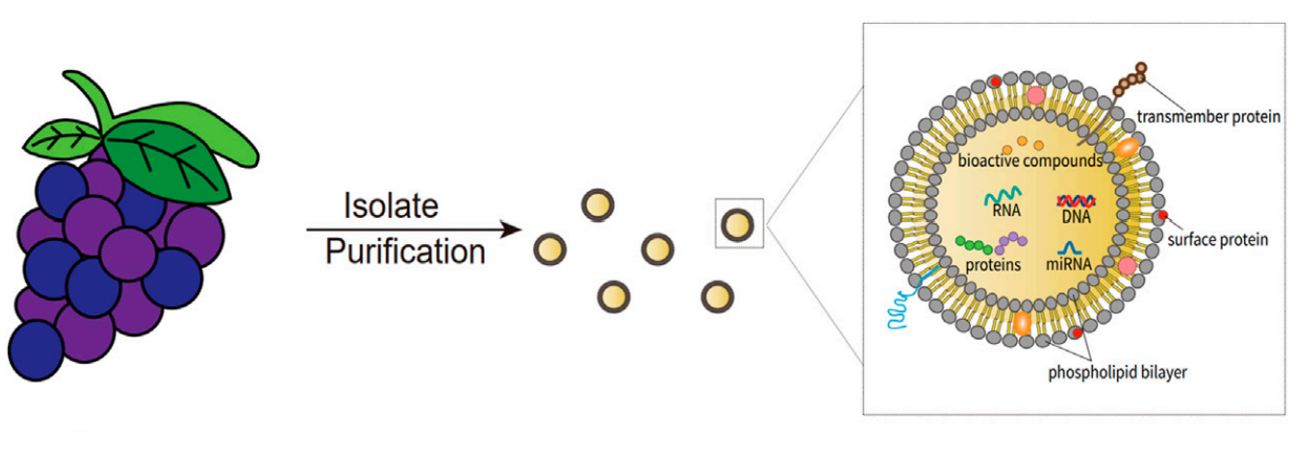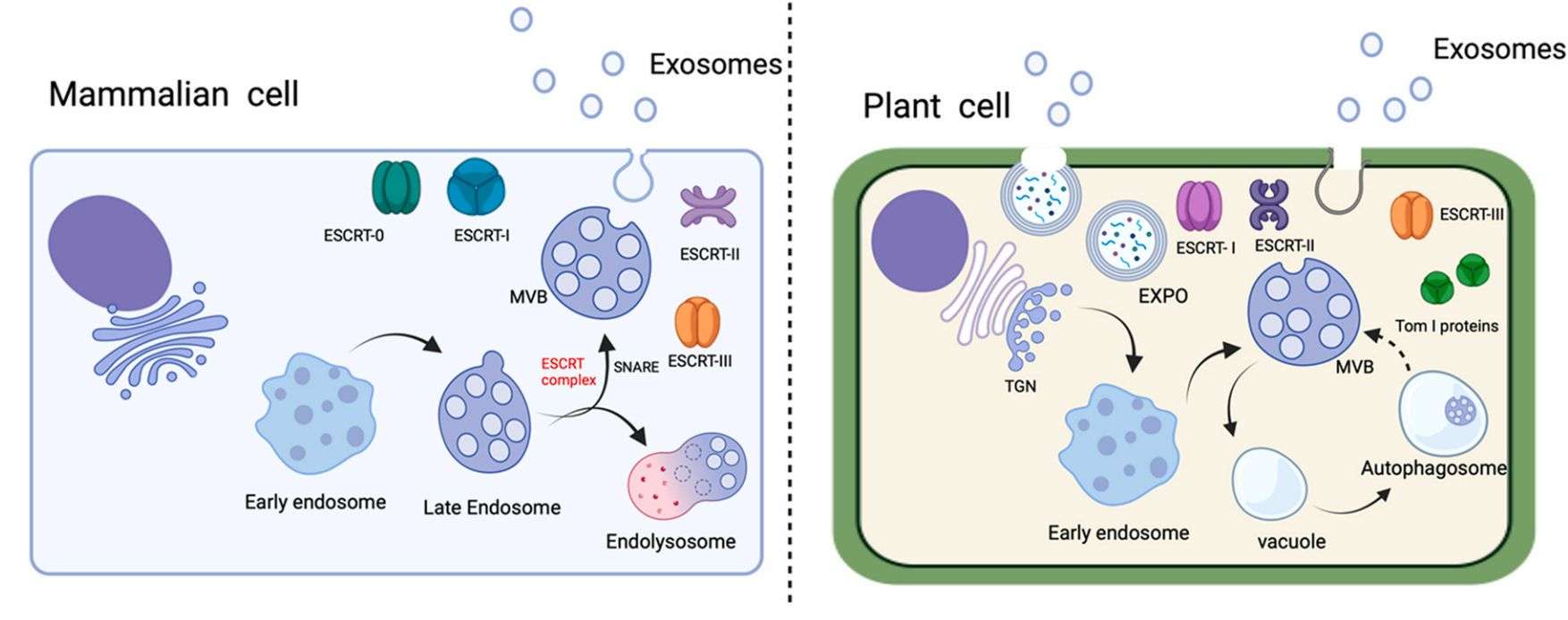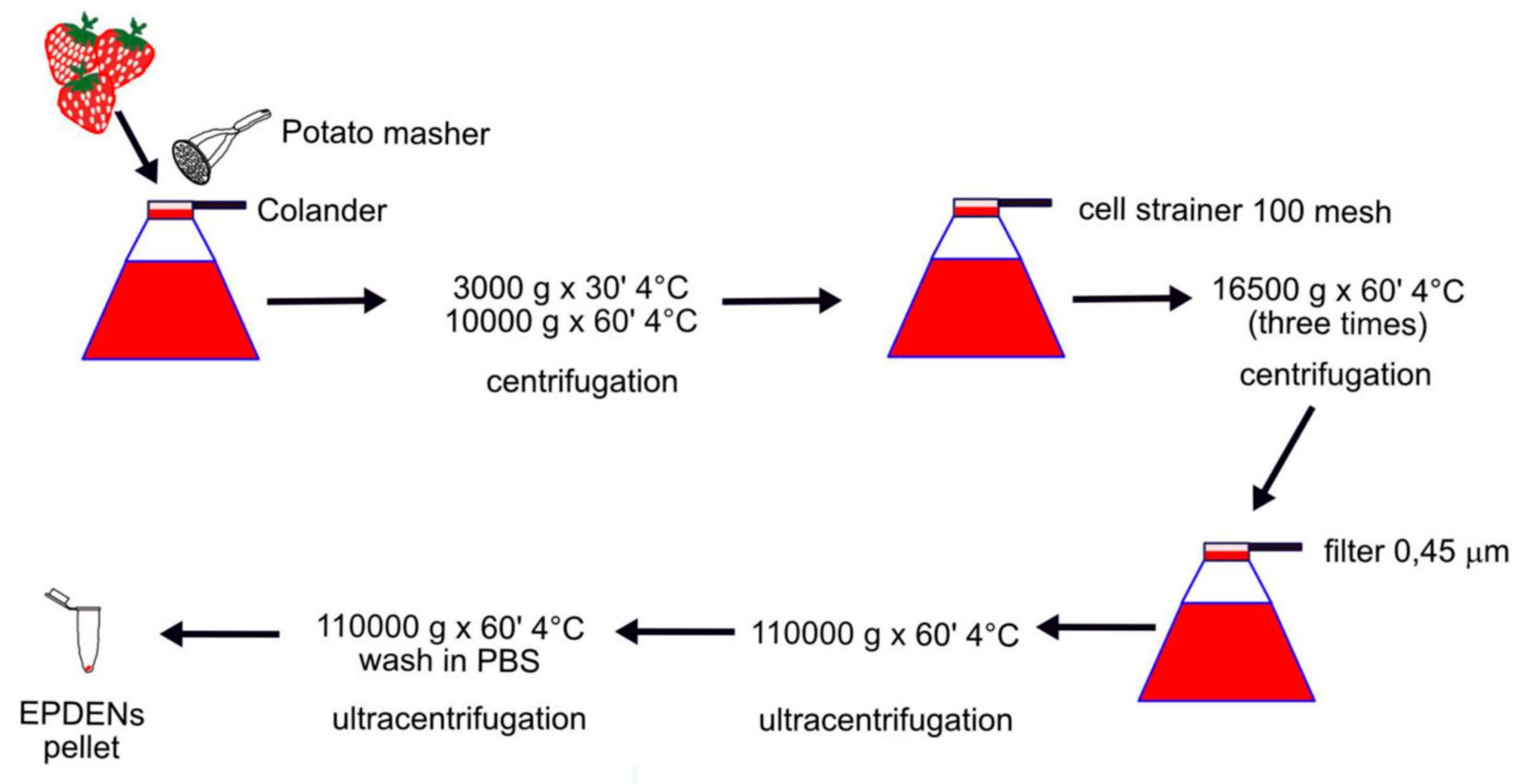Research on Fruit-derived Exosome
Plant-derived exosomes have been isolated and have attracted attention as promising bioactive molecules. It has been reported that plant-derived exosomes may act on mammalian cells through their specific cargoes. Exosomes isolated from fruits and mammalian-derived exosomes are similar in size and contents, opening new perspectives for their involvement in intercellular communication and regulation of important biological processes. In addition, various bioactive compounds, such as antioxidants and vitamins, are present in fruit-derived exosomes, which may have biological functions and potential applications.
 Figure 1. Exosomes isolated from grapes. (Teng Y, et al., 2022)
Figure 1. Exosomes isolated from grapes. (Teng Y, et al., 2022)
Why Study Fruit-Derived Exosomes?
Exosomes in fruits can enhance the nutritional value of fruit juices and provide additional protection for bioactive compounds to exert their functional properties, such as anti-inflammatory and antioxidant properties, with associated health benefits. The study of fruit-derived exosomes holds many potential benefits in nutrition and medicine.
- Fruit-derived exosomes are naturally occurring nanovesicles that carry bioactive molecules, including proteins, lipids, and genetic material, that can interact with cells in the body and influence a variety of biological processes.
- Fruits are rich in exosomes, relatively easy to isolate from fruit juices or extracts, and are an environmentally friendly and cost-effective source of therapeutic agents.
- The study of fruit-derived exosomes opens new avenues for sustainable and plant-based biotechnology applications, in keeping with the trend towards green and natural products in healthcare and nutrition.
What are the Benefits of Fruit-derived Exosomes over Mammalian Exosomes?
Fruit-derived exosomes are an emerging field of research that offers innovative opportunities in drug delivery, medicine, and biotechnology. Unlike mammalian exosomes, fruit-derived exosomes have low immunogenicity, reducing the risk of adverse immune responses when used for therapeutic purposes. Exosomes isolated from fruits can be engineered to enhance targeting or introduce new functions, becoming versatile tools for targeted drug delivery systems and nutraceuticals. In addition, fruit-derived exosomes from edible sources ensure a higher safety profile, paving the way for more consumer-acceptable and regulatory-friendly applications.
Fruit-derived exosomes have been widely investigated as drug carriers because of the following characteristics:
- Good biocompatibility.
- Non-toxic and low immunogenicity.
- High specific targeting ability.
- Can prolong the duration of drug action and the metabolic cycle of drugs.
- The extraction method is simple and can be produced in large quantities.
- It can cross the blood-brain barrier and the placenta.
 Figure 2. Biogenesis of exosomes in mammalian and plant cells. (D. Subha, et al., 2023)
Figure 2. Biogenesis of exosomes in mammalian and plant cells. (D. Subha, et al., 2023)
How to Isolate Exosomes from Fruits?
Isolation of fruit-derived exosomes usually involves a series of steps as follows.
1. Differential speed centrifugation
The fruit homogenate is subjected to a series of centrifugation steps at different speeds to sequentially remove cellular debris and larger vesicles.
2. Ultracentrifugation
Exosomes are further purified using ultracentrifugation (centrifugation of the sample at speeds typically over 100,000g).
3. Density gradient centrifugation
The exosome pellet is resuspended in a density gradient medium (e.g., sucrose or iodine diol) and centrifuged to separate the exosomes based on their buoyant density.
4. Filtration
Filtration through a filter membrane of a specific pore size can help to separate particles that are different in size from the exosomes.
 Figure 3. Schematic of the method for isolation and purification of exosomes from strawberries. (Perut F, et al., 2021)
Figure 3. Schematic of the method for isolation and purification of exosomes from strawberries. (Perut F, et al., 2021)
After isolation, exosome characterization is often required to ensure high purity and functional integrity.
- Transmission Electron Microscopy (TEM): To observe morphology.
- Nanoparticle Tracking Analysis (NTA): To determine particle size and concentration.
- Western Blotting: To identify specific exosome markers (e.g. CD63, CD81, Hsp70).
What are the Applications of Fruit-derived Exosomes?
Drug Delivery
Fruit-derived exosomes can be designed to encapsulate drugs, making them effective carriers for targeted drug delivery. They can cross biological barriers and deliver therapeutic agents to specific cells or tissues, thereby increasing therapeutic efficacy and reducing side effects. Research has found that grapefruit-derived exosomes are inherently anti-inflammatory and can be used as oral drug carriers to deliver anti-inflammatory drugs.
Skin Care
Fruit-derived exosomes are increasingly being used in cosmetic formulations due to their skin-friendly properties. These exosomes can deliver active ingredients deep into the skin for the treatment of aging, inflammation, and hyperpigmentation. For example, apple-derived exosomes play a role in skin protection as novel anti-inflammatory compounds that can alter extracellular matrix production in dermal fibroblasts and also reduce extracellular matrix degradation by increasing collagen synthesis and down-regulating metalloproteinases.
Immunomodulation
Fruit-derived exosomes can modulate the immune response, providing potential benefits in the treatment of inflammatory and autoimmune diseases. They can help regulate immune cell activity and reduce inflammation. Studies have found that apple-derived exosome miRNA-146a induces anti-inflammatory signaling in several cell lines by inhibiting the NF-kb pathway, demonstrating the ability to talk directly to the immune system, which has high clinical potential.
Cancer Therapy
Research suggests that fruit-derived exosomes may play a role in cancer therapy. These exosomes can be engineered to carry anti-cancer drugs or genetic material that specifically targets cancer cells, providing a new treatment approach with reduced toxicity. For example, lemon-derived exosomes can target tumor cells and exert anti-tumor effects. Because of the similar pH between lemon and stomach, lemon exosomes have good stability in the gastrointestinal tract and good safety, with no adverse reaction to the liver, kidney, spleen, etc. Their anti-tumor effect is positively correlated with the production of reactive oxygen species.
Health Products
Fruit-derived exosomes can be incorporated into functional foods and beverages to enhance nutritional value. These exosomes contain naturally occurring bioactive compounds such as antioxidants, vitamins, and lipids that can promote health and prevent disease. For example, strawberry-derived exosomes preserve vitamin C activity and prevent oxidative stress in human cells. Citrus fruits are a natural source of ascorbic acid and exosomes isolated from these fruits have ascorbic acid capacity.
After decades of development and research, fruit-derived exosomes have become a well-recognized and highly promising natural bioactive ingredient that can be used directly as a therapeutic agent in a variety of animal disease models. In addition, fruit-derived exosomes can be used as carriers to deliver anti-inflammatory and anti-tumor drugs to targets.
Creative Biostructure understands that fruit-derived exosomes have excellent biological and physical properties, and we provide high-quality fruit-derived exosome products to help clients explore the potential applications of exosomes in biomedical fields.
| Cat No. | Product Name | Source |
| Exo-PDELN05 | HQExo™ Exosome-Seaberries | Exosome derived from Seaberries |
| PNE-FB13 | PNExo™ Exosome-Bilberry | Exosome derived from Bilberry |
| PNE-FA18 | PNExo™ Exosome-Apple | Exosome derived from Apple |
| PNE-FB33 | PNExo™ Exosome-Blackberry | Exosome derived from Blackberry |
| PNE-FB34 | PNExo™ Exosome-Blueberry | Exosome derived from Blueberry |
| PNE-FC38 | PNExo™ Exosome-Cranberry | Exosome derived from Cranberry |
| PNE-FB42 | PNExo™ Exosome-Banana | Exosome derived from Banana |
| PNE-FB45 | PNExo™ Exosome-Black Plum | Exosome derived from Black Plum |
| PNE-FC48 | PNExo™ Exosome-Cherry | Exosome derived from Cherry |
| PNE-FD50 | PNExo™ Exosome-Durian | Exosome derived from Durian |
| PNE-FC54 | PNExo™ Exosome-Coconut | Exosome derived from Coconut |
| PNE-FJ58 | PNExo™ Exosome-Juniper Berry | Exosome derived from Juniper Berry |
| PNE-FE65 | PNExo™ Exosome-Emerald Gem Melon | Exosome derived from Emerald Gem Melon |
| PNE-FG69 | PNExo™ Exosome-Green Plum | Exosome derived from Green Plum |
| PNE-FC85 | PNExo™ Exosome-Concord Grape | Exosome derived from Concord Grape |
| PNE-FP93 | PNExo™ Exosome-Prickly Pear | Exosome derived from Prickly Pear |
| PNE-FL101 | PNExo™ Exosome-Lotus nut | Exosome derived from Lotus nut |
| Explore All Exosomes Isolated from Fruits | ||
Creative Biostructure is committed to offering high-quality exosome products to advance the field of exosome research. If you are interested in our products and services, please feel free to contact us.
References
- Teng Y, et al. Grape exosome-like nanoparticles: A potential therapeutic strategy for vascular calcification. Front Pharmacol. 2022. 13: 1025768.
- D. Subha, et al. Plant derived exosome-like Nanovesicles: an updated overview. Plant Nano Biology. 2023. 3: 100022,
- Perut F, et al. Strawberry-Derived Exosome-Like Nanoparticles Prevent Oxidative Stress in Human Mesenchymal Stromal Cells. Biomolecules. 2021. 11(1): 87.
- Trentini M, et al. Apple Derived Exosomes Improve Collagen Type I Production and Decrease MMPs during Aging of the Skin through Downregulation of the NF-κB Pathway as Mode of Action. Cells. 2022. 11(24): 3950.